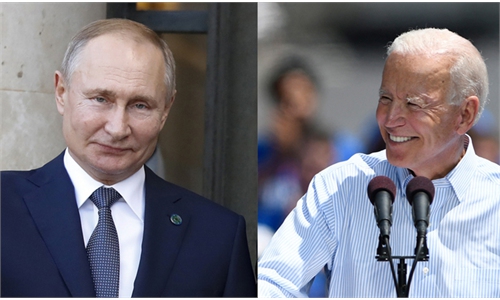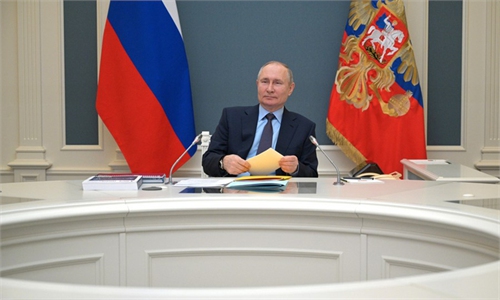IN-DEPTH / IN-DEPTH
US tricks revealed as expelled Russian students latest victims in persisting Western ideology war against former Soviet Union and Eastern European countries

photo: VCG
In April 2020, the Russian Foreign Ministry received an SOS message from 74 Russian high school students who had been kicked out onto the streets by the US government and their host families. These students were participants in a secret special operation organized by the US State Department called the Secondary School Student Program, of which the Russian Foreign Ministry had no previous knowledge.
Analysts said the real purpose of the so-called Secondary School Student Program was for the US Embassy in Russia to select a group of Russian teenagers to live with American families for a year free of charge, in order to undergo systemic "brainwashing" and to supplant Russian values with American ones, which aimed to cultivate a force that would help the US subvert Russia.
Russia refused to participate in this program as early as in 2014. But the US embassy had in fact been secretly working on it and kept the Russian side in the dark.
US' tricks
According to Russian media reports, the Russian government discovered in 2014 that some American NGOs supporting the Secondary School Student Program were registered as NGOs in Russia with funding from the American Councils for International Education. Russia then designated these organizations as foreign government agents and terminated the program.
But the 74 Russian high school students who were forced onto the streets made the Russian government aware that the program had in fact not been terminated and that the US State Department and the US Embassy in Moscow had been secretly pushing it. The selected students were sent to the US on private visas.
The predecessor of the Secondary School Student Program was the Russian-American student exchange program which began in the late 1980s. At that time, the exchange program to the US was regarded by Russian teenagers as a precious opportunity, and they were very enthusiastic about it.
In 1992, the US government simplified the program and created the Flex-Future Leaders Exchange Program or FLEX. It's reported that FLEX selected talented teenagers and funded them to stay with US host families for a year while the indoctrination of American values took place. The program was canceled by Russia in 2014.
Since 1992, about 22,000 Russian students had participated in the program. None of them stayed in the US, but all returned to Russia. Some became prominent journalists, university lecturers, opinion leaders, and members of human rights and environmental groups.
The American way of life and values are imprinted on these people's minds, and they often actively promote their experiences in the US. In this way, the US has effectively created an "alternative elite" in other countries, analysts said.
On the website of the US Embassy and Consulates in Russia, there is a similar program named Alumni Programs. Since 1992, US government-funded exchange programs have brought more than 75,000 Russian citizens to the US for education, exchange, and training activities. These programs offer participants an opportunity to obtain knowledge and develop skills in their fields of expertise and to establish valuable contacts with US colleagues, read the introduction on the website.
Alumni is able to find grant and funding opportunities worth more than $33 billion and winning teams of the Alumni Engagement Innovation Fund will be awarded up to $50,000 in support of projects, according to the website.
The Exchange Programs on the website of the US Embassy and Consulates in Russia has a variety of programs including the Humphrey Program, the Russia Youth Environmental Program, the Russia Youth Leadership, and the Entrepreneurship Virtual Exchange, among others.
Zhang Hong, a research fellow from the Institute of Russia, Eastern European, and Central Asian studies at the Chinese Academy of Social Sciences, told the Global Times that Russia has also experienced a change in its attitude toward foreign funding for local NGOs.
From the disintegration of the Soviet Union in 1991 to 2003, the Russian government was generally open to or even acquiesced to the activities of NGOs supported by foreign funds. In 2003, after the outbreaks of the "color revolutions" in many countries, Russia instituted new laws and regulations to manage foreign-funded NGOs but did not prohibit them.
In 2013, due to tensions between Russia and the US, Russia gradually expelled foreign foundation, such as the National Endowment for Democracy and the Open Society Foundations, and prevented them from continuing to fund NGOs in Russia. As a result, some NGOs had to register as foreign agents. In this context, the US embassy programs in Russia gradually came to the fore.
Zhang said that the US has made great efforts to cultivate a "civil society" and "opinion leaders" in Russia and incite a "color revolution." This is also related to the fact that after the disintegration of the Soviet Union, the Russian government had relaxed its management of NGOs for a period of time, which led to the growth of NGOs in various places in Russia.
In Western values, the "civil society" is considered to be an important part of the fight against "bureaucracy," The West has noticed that political issues are less likely to attract public attention compared to social issues such as women's and human rights as well as opposition to domestic violence and environmental protection, and it is easier to cultivate young opinion leaders to take on these causes.

photo: VCG
Delivery of 'truth'
The Eastern European bloc had been a key region for the US in promoting the "color revolution," also serving as its breeding ground.
In October 1950, in order to launch the propagandist attack targeting Eastern European bloc, under the encouragement of the US National Security Council, the then Under Secretary of State James Webb gathered some American scholars to form a highly confidential research group to conduct Project Troy, which was to find a theory and means to deliver the "truth" to the other side of the Iron Curtain.
Deployed under then president Harry Truman, the US publicity machine launched "Campaign of Truth" as the opening salvo in an enduring and comprehensive psychological propaganda war. It included directing Voice of America (VOA), Radio Free Europe (RFE), and other propaganda machines specifically used to incite internal rebellions in Eastern European bloc to break through the "interference" of the Soviet Union.
According to the suggestions of Project Troy, VOA and the BBC worked in tandem to counterattack the "interference" of the Soviet Union. They increased the numbers and frequencies of broadcasts and improved technologies. In April 1951, VOA increased its audience in the Soviet Union and Eastern Europe by 25 percent.
Some scholars pointed out that the US instigated people in the Eastern European bloc by promoting the illusion of the "beautiful Western life." In addition to taking care of and relocating defectors, the project focused on using defectors for propaganda, intelligence gathering, and covert operations, in order to weaken the socialist countries in the Eastern Europe.
Project Troy achieved remarkable results. In the Hungarian Revolution of 1956, the RFE Hungary Service advocated the overthrow of the government on a daily basis and their programs were popular among Hungarian intellectuals.
Still spreading
To this day, various projects like Project Troy are still harvesting what they had sown.
Forces instigated by the US are stirring chaos in local governments, crowding out honest and decent officials, intensifying youth-aimed propaganda in different countries, and making them pro-Western.
To this end, the US has established a large number of nongovernmental organizations among other institutions. Under the guise of humanitarian projects, the US has built up various foundations and grant programs to promote Western ideas and values among the public and form an ideology with the goal of overthrowing targeted governments.
In Kyrgyzstan, there is one NGO for every seven adults. The US has spent considerable amount of funds to support the huge number of opponents, informal youth organizations, and pro-Western media in Kyrgyzstan. In 2020 alone, the US Agency for International Development had spent $25 million in Kyrgyzstan.
That same year, the US Embassy in Kyrgyzstan initiated a project to attract young leaders in the five Central Asian countries and Afghanistan with an aim to introduce US diplomatic policies. Each individual is likely to receive $90,000 to $120,000 worth of support.
In 2019, NED spent about $1 million on Russia, and the majority was given to the project to exploit the potential Russian radicals. NED also sponsored some projects that encouraged Russian educators and young people to discuss the effect of political oppression in the history of Russia.
In Belarus, in the past 12 years, the US has spent a total of more than $130 million to promote the "democratization" of the country. Russia's intelligence agency said that in 2019-20, the US availed $20 million in aid to Belarus to support online influencers responsible for organizing anti-government protests.
In Egypt, even though some NGOs look legitimate, whenever the country experiences turmoil, they took advantage of the situation, stirring up trouble and fanning flames.
A leader of Egypt's April 6 Youth Movement, an anti-government activist, was invited to New York for the International Coordination Meeting of Youth Organizations in 2008. He admitted later in a documentary that he had undergone an "internship" and was familiar with how to cope with police violence.
Reason to export ideology
What makes the US spare no effort to promote "democratization" around the world?
A Russian political scholar analyzed that there are at least two reasons. First is the financial factor that Washington must "write off" accumulated debt by constantly exporting tensions to the outside world and artificially "fueling" conflicts globally.
The second is for cultural reasons. The propaganda machine of the US is constantly portraying other leaders as "evil" to keep the audience's interest nonstop.
Therefore, consolidating global inequality and maintaining the uneven distribution of resources and wealth around the world is becoming one of the most important foreign policy goals of the West. The West's "soft power" effectively stiffs any other solution to the global crisis in the world, luring its potential rivals into thinking that its own civilization is inherently inferior to that of the West, and thus enjoying its infamous superiority and legitimacy.
The West exports "democracy" to promote a "color revolution," which in turn led to a refugee crisis, which promoted a populist crisis. The policies chosen by the West have led to spiraling troubles.
The "soft power" displayed by the West does not promote Western values, but serves only the vested interests of Western ruling elites, a practice with few supporters even back home in the US.
It is worth mentioning that most of the above-mentioned 74 Russian high school students were taken repatriated by the Russian Foreign Ministry. The remaining students, with the support of their parents, plan to stay in the United States until their scheduled return date in May or June this year.


